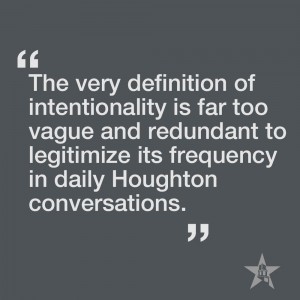Over four long years living and working in one location, it’s easy to develop a list of pet peeves and annoyances specific to Houghton campus. You can refer to your own list of grievances–maybe you don’t like the isolation. Maybe you’re fed up with the weather. Many of the typical complaints, I’m sure, have to do with the side-effects of living in a Christian community. I’ve heard numerous people disparage the over-use of buzzwords and phrases such as “blessed,” “on my heart,” and “accountability.” What I rarely hear discouraged, however, are academic buzzwords. Perhaps it’s due to the fact that many people on campus have been steeped in religious language their whole lives, whereas all the isms of academic language–existentialism, postmodernism, dispensationalism–are a new and exciting experience.
 One word in particular that never fails to irk me is intentionality. This word seems to be a house favorite at Houghton College. I heard it so often my first year that I couldn’t help but assume that Houghton must be the most prudent place on earth: a magical land in slow-motion where people move with deliberate and measured steps everywhere they go, like studious sloths. Little did I know that the word’s usage would only continue to multiply until this my senior year, when it colors the speech of my fellow classmates like profanity from the mouth of a sailor.
One word in particular that never fails to irk me is intentionality. This word seems to be a house favorite at Houghton College. I heard it so often my first year that I couldn’t help but assume that Houghton must be the most prudent place on earth: a magical land in slow-motion where people move with deliberate and measured steps everywhere they go, like studious sloths. Little did I know that the word’s usage would only continue to multiply until this my senior year, when it colors the speech of my fellow classmates like profanity from the mouth of a sailor.
What is it that intentionality means, exactly? Since living with intention is the new purpose-driven life, we ought to have a solid definition. Most often when my peers discuss living with intention, what they mean is that they intend to make informed decisions and see situations from every possible angle. They want to live in a way that they believe does no harm to anyone else. They want to make a difference. They want to put their passions behind their actions.
Those are an awful lot of connotations to demand from one word. According to the Stanford Encyclopedia of Philosophy, intentionality is “the power of minds to be about, to represent, or to stand for, things, properties and states of affairs.” Dictionary.com defines intentional as “done with intention or on purpose.” Intention is purpose, purpose is intention. The fact is, the very definition of intentionality is far too vague and redundant to support its frequency in daily Houghton conversations. It’s a superficial word, and its iteration is ever-so-slightly pretentious, attributing more weight to our actions (or lack thereof) than what might actually exist. After all, what is unintentional? Anything we choose to do, by definition, is intentional. While we are in college, “living” with intention ends up being “thinking” with intention. But, when we graduate, will we be able to make the transition to “acting” with intention, and, more importantly, will we graduate with grand ideas only to realize that, in the “real world,” intentionality just might be completely meaningless?
No matter your personal impression and use of the word, the question remains: how are our academic concepts and “intentions” going to translate into life after college? Our culture of late is intensely focused on youth, experience, and personal happiness. I scroll over countless Buzzfeed and Thought Catalog articles covering fantastic places that you simply have to visit, all the best things to do before you die, how to put your own happiness first, how to worry less, why money isn’t important, and why you should avoid committing to a career path, marrying, or settling in any way when you are “too young,” i.e. below thirty-five. This mentality can’t help but to affect the mindsets of twenty-somethings across the board, even at Houghton, and even if only minimally. It’s likely that it springs from the currently dismal job and economic climate–a way to seem in control when one’s life will be inevitably remain aimless either way. Paired with the earnest Houghton student’s vision of impact and intentionality, however, this presents an interesting conundrum. The “real world,” for all the hard knocks and gritty characteristics that we make it out to inhabit, simply will not contain very many momentous and important decisions. We will be working at coffee shops and retail stores. We will be grasping for any opportunities that we can, and embracing any occasions for freedom.
I believe in doing good acts. I believe in helping others, working hard, and sticking to my principles. And I definitely think that the word intentionality is much too limited and ambiguous a word to encapsulate all of that. It is unrealistic, and it cannot survive life after Houghton. Applying the word intentionality too liberally idealizes the concept and distracts us from the honest choices that we will make in our lives. We need to start using the word intentionality with more intentionality.

One thought on “Intentional, By Any Other Name”
Comments are closed.